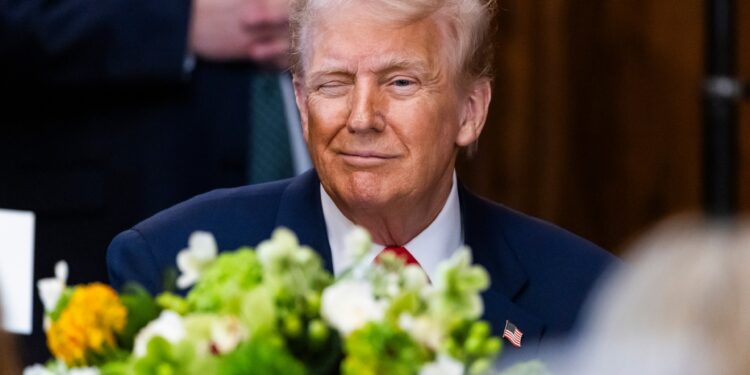Global economies are facing a growing threat due to the sharp escalation in the commercial wars led by the administration of US President Donald Trump, as the OECD Organization warned that these policies may lead to a slowdown in global economic growth and high inflation, forcing central banks to keep interest rates high for a longer period.
Decreased economic growth and high costs
The latest estimates of the Organization for Economic Cooperation and Development indicate that global growth will slow from 3.2% in 2024 to 3.1% in 2025 and 3% in 2026, which represents a decline in the previous expectations issued last December.
The organization attributed this decrease to the increasing commercial barriers and the escalation of uncertainty, which hinders commercial investment and leads to a decrease in consumer spending.
At the regional level, the main economies suffer from the repercussions of this trade war:
- US: Its economic growth is expected to slow to 2.2% in 2025 and then to the level of 1.6% in 2026, compared to the equivalent of 2.4% and 2.1% in previous estimates.
- Canada: Growth is expected to decline to only 0.7% during 2025 and 2026, which is much lower than previous estimates of 2%.
- Mexico: It will suffer from economic stagnation, as its economy is expected to shrink by 1.3% in 2025 and 0.6% in 2026, compared to previous estimates that expected to achieve 1.2% growth in 2025 and 1.6% in 2026.
The organization also reduced its expectations for the growth of the euro area:
- The German economy is expected to achieve small growth by only 0.4% in 2025, compared to its previous 0.7%.
- France will witness 0.8% growth, a decrease of 0.1% from December estimates.
Growth in Japan and China:
- The organization has reduced its expectations on the growth of Japan’s economy, one of the most prominent trading partners of the United States, to 1.1% (a decrease of 0.4%).
- China has missed expectations, as it is expected to achieve 4.8% in 2025, with a slight increase (0.1%) compared to last December expectations
Inflation continues pressure
In addition to slowing growth, customs duties raise prices, exacerbating global inflation. According to the Cooperation Organization accounts, the US customs duties imposed by 25% on the goods coming from China, Canada and Mexico, as well as possible increases in fees on aluminum and steel imports, will permanently raise prices.
The organization emphasized that in light of this scenario, the American Federal Reserve and other central banks will need to keep interest rates high for a longer period, which may lead to a greater slowdown in economic growth and increase pressure on global financial markets.
Additional pressure from Trump
The reports issued by Bloomberg adds that the Trump administration does not exclude the entry of the American economy in a stagnation, as the president said in an interview with Fox News: “What we do is to completely reshape the US economy, and there may be a difficult transitional stage, but that is necessary to achieve a more prosperous future,” added reports by Bloomberg.
Despite Trump’s attempts to reassure the markets, the uncertainty has exacerbated, as the S & B 500 index decreased by 10% since mid -February, which prompted some analysts to warn of the possibility of investor confidence collapsing.
The need for stability
Matthias Korman, Secretary -General of the Organization for Economic Cooperation and Development, stressed in an interview with Bloomberg that the continued commercial escalation may lead to catastrophic effects on the global economy, saying: “If current decisions continue and customs duties increase, we may have to review our expectations again and reduce them more.”
He added that there are some factors that may enhance economic growth, such as increasing European defense spending, but warned that this would also exacerbate financial burdens on governments.
China and Europe .. Can the crisis be avoided?
Despite the escalation of trade tensions, Bloomberg indicated that the Chinese economy may be more able to bear the impact of customs duties, as it is expected to grow by 4.8% in 2025, supported by government measures aimed at compensating for the effects of US tariffs.
As for Europe, it faces less risks directly than the American trade war, but it is still affected by the state of uncertainty in the global economy, as the Organization for Cooperation and Development has reduced its expectations for growth in the eurozone, noting that economies such as Germany and France will continue to suffer from poor investment and slowdown.
Undoubted future
Data and reports show that the commercial wars led by the Trump administration threaten global economic stability, as they lead to:
- Slowness of growth.
- High prices
- Increased uncertainty
- All this will force central banks to adopt more strict monetary policies.
Under these circumstances, global markets and investors are facing unprecedented challenges, while continuing commercial tensions and unexpected economic policies, making the economic future more foggy than ever.



